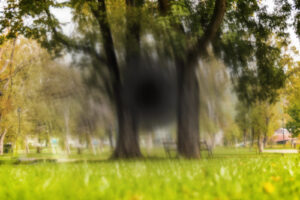
Macular degeneration, also called age-related macular degeneration (AMD), is an eye disease that damages your macula. The macula is at the center of your retina and responsible for your sharp, straight-ahead vision.
Macular degeneration affects your central vision but typically doesn’t impact your peripheral or side vision. AMD is a leading cause of permanent vision loss in older adults.
Keep reading to learn more about the different types of macular degeneration and common symptoms of AMD!
What Are The Types of Macular Degeneration?
There are two types of macular degeneration: wet and dry.
Dry Macular Degeneration

Around eighty-five to ninety percent of people with AMD have dry AMD. It occurs when small yellow protein deposits known as drusen collect under your macula.
The buildup of drusen dries and thins your macula, causing reduced or blurred central vision. Vision loss from dry AMD tends to happen slowly. And in some cases, dry AMD can progress to wet AMD.
Wet Macular Degeneration
About ten to twenty percent of people with dry macular degeneration develop wet macular degeneration. Wet AMD happens when abnormal blood vessels form under your macula and retina and then leak fluid and blood, a condition called choroidal neovascularization (CNV).
The accumulation of fluid and blood causes your macula to bulge, distorting vision. Wet macular degeneration is more severe and can quickly cause complete loss of central vision.
What Are the Symptoms of Macular Degeneration?
The symptoms of macular degeneration are painless and often develop gradually, so you might not notice any changes in your vision. But as the condition worsens, you may experience the following symptoms:
Reduced Central Vision
Loss of central vision is a hallmark of macular degeneration. With time, you may notice a tiny dark spot or smudge in your central vision.
The dark spot or smudge can make it hard to see fine details, whether looking at far, intermediate, or up-close objects. As a result, you might have difficulty recognizing faces.
The smudge or dark spot may gradually increase in size and number. Eventually, these spots merge, causing a loss of central vision.
Being unable to recognize the faces of your loved ones can be quite upsetting. But with prompt treatment, you can preserve your vision for as long as possible.
Blurred Vision
Another tell-tale symptom of macular degeneration is blurred or fuzzy vision. Blurred central vision means that your vision isn’t as clear, crisp, or sharp and affects activities like reading, sewing, and watching TV.
Ensure you visit your eye care professional if you have blurred vision.

Colors are Less Vivid
When you have macular degeneration, your color vision might not be as good as it once was. Colors tend to look less vibrant and faded.
As a result, you may find it difficult to distinguish subtle shades of colors.
For instance, you might have a hard time telling the difference between black and dark blue.
Straight Lines Appearing Crooked
Straight lines may appear bent in the central area of your vision when they’re actually straight. Words on the menu or a straight surface like a table can look wavy when you have macular degeneration.
Visual distortion can impact your ability to perform simple, routine activities and enjoy your hobbies. It’s important to see an eye doctor right away if you’re experiencing this symptom.
Need for Brighter Lighting
Everything around you may seem darker than usual, regardless of the time of day. Consequently, you may require more light to complete daily tasks.
Your eyes might also take longer to adjust when moving from a dark room to a bright one. If you require more light to cook, read, and complete other activities, contact your eye doctor.
Early detection and treatment of macular degeneration can help delay vision loss and improve your quality of life.
Trouble Driving at Night
Sensitivity to glare is a common sign of macular degeneration.
Glare from oncoming headlights can be blinding, making it unsafe to get behind the wheel, especially at night. If you’re sensitive to glare, it’s crucial to see your eye doctor right away to get to the bottom of the problem.
Loss of Depth Perception
Loss of depth perception can be a sign of macular degeneration. It’s defined as the inability to correctly gauge the distance and space between objects.
With impaired depth perception, you’re more prone to accidents and injuries. For instance, it becomes difficult to know how low or high a step is, making it harder to climb the stairs without slipping, tripping, or falling.

If you suspect you have impaired depth perception, visit your eye doctor for a comprehensive evaluation. Timely detection and treatment can prevent the quick progression of macular degeneration.
Save Your Sight from Macular Degeneration
Macular degeneration doesn’t have a cure. However, if it’s detected early, you can start treatment to delay or prevent further vision loss.
That’s why the experienced doctors at Joshi Retina Institute recommend regular eye exams, so they can closely monitor your eye and vision health.
Have you had your annual eye examinations yet? Schedule an appointment at Joshi Eye Institute in Boynton Beach, FL, today!



